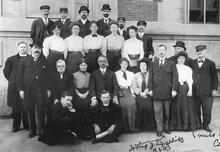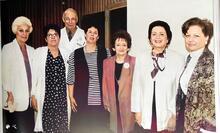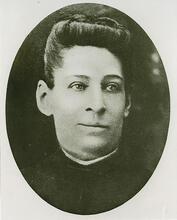Rebecca Machado Phillips
Rebecca Machado Phillips tended her community by founding soup kitchens and aid societies for the poor and sick. Phillips’s parents had come from Portugal, where their families had kept their Judaism secret, but in America her father served as cantor of New York’s Spanish and Portuguese synagogue. In 1762, just shy of sixteen, she married and started a family, ultimately bearing 21 children. After the Revolutionary War forced their family to move to Philadelphia, Phillips raised funds for ritual objects for the new Mikveh Israel synagogue. In 1801 she helped found the Female Association for the Relief of Women and Children in Reduced Circumstances. In 1820, at age 74, she became “first directress” of the Female Hebrew Benevolent Society of Philadelphia.
Rebecca Phillips’s life embodies the overlapping of the mundane and the exceptional: she not only was a mother, but also served as a pioneering leader in Jewish and secular American communal life.
Early Life
Rebecca Machado Phillips was born in Reading, Pennsylvania, on November 21, 1746. She was the elder of two daughters born to María Caetana (Zipporah) and Rev. David Mendez Machado. Both of her parents were born in Portugal, and their families had been secret Jews in Lisbon for generations.
Her parents settled in New York, where David Machado served as Synagogue cantorhazzan of Shearith Israel, the Spanish and Portuguese synagogue. He died a year after Rebecca’s birth, on December 4, 1747. Her mother remarried shortly thereafter to Israel Jacobs, producing Rebecca’s half-sister Rachel. Sixteen-year-old Rebecca Machado was married on November 10, 1762, in Hickory Town, Plymouth Township, Montgomery County, Pennsylvania, to Jonas Phillips, a merchant eleven years her senior.
Marriage and Family
Shortly after their marriage, the couple moved to New York, and by the next autumn, the first of their children was born. The early years of marriage were financially strained, though by the second decade of their marriage, the Phillips family became prosperous. According to Philadelphia tax records of 1781 and 1782, Jonas Phillips, who worked as a merchant during the Revolution, was the second wealthiest Jew of the city. From age seventeen to forty-six, Rebecca Phillips bore 21 children. Later Rebecca and Jonas Phillips also demonstrated their philanthropy through the adoption of their orphaned grandchildren, Mordecai Manuel and Judith Noah.
The Phillips family remained in New York until the occupation of that city by the British army in 1774 prompted their move to Philadelphia. Dr. Benjamin Rush’s letter to his wife, describing the marriage ceremony of eighteen-year-old Rachel, the fifth child of Jonas and Rebecca, is the only surviving account of an eighteenth-century Jewish wedding.
Social Work
In 1782, Phillips and Grace Nathan undertook to raise and collect funds for the purchase of ritual objects for the newly founded Ritual bathMikveh Israel synagogue of Philadelphia. In 1801, Phillips was one of the founding members of the Female Association for the Relief of Women and Children in Reduced Circumstances, an organization dedicated to assisting yellow fever victims in Baltimore, supporting a soup house for the poor, and generally providing food and clothing to indigent women and children. Phillips’s philanthropy is also evident in her bequest of a large scroll of the Book of Esther, the Lit. "scroll." Designation of the five scrolls of the Bible (Ruth, Song of Songs, Lamentations, Ecclesiastes, Esther). The Scroll of Esther is read on Purim from a parchment scroll.megillah from which the hazzan at Congregation Shearith Israel has traditionally read.
In 1820, at age seventy-four, Rebecca Phillips served as “first directress” and one of thirteen managers on the board of the Female Hebrew Benevolent Society of Philadelphia. The society, founded in 1819 to assist the Jewish indigent, was the first Jewish charitable society in America not associated with a synagogue. Phillips’s responsibilities are delineated in the Society’s constitution: “The first Directress shall preside at the meetings of the Board of Managers, preserve order, appoint committees, call special meetings, and give the casting vote in questions where the board are equally divided.”
The society held two general meetings yearly, while managers met once every two weeks during the winter and more frequently if needed. In 1820, Phillips paid the society an annual subscription of three dollars (two dollars annually was required for membership). The last record of Phillips’s public involvement dates to 1825, when she donated thirty dollars to Mikveh Israel’s Building Committee.
Later Life
Jonas Phillips died in 1803. Rebecca spent the last twenty-eight years of her life as a widow. The engraving on the tomb of Jonas Phillips in the burial grounds of Shearith Israel reads: “Jonas Phillips, Merchant / son of Aaron Uriah Phillips / and husband of Rebecca Mendez Machado.” According to an unconfirmed source, the tombstone had originally depicted Rebecca seated at her late husband’s grave, accompanied by a small child.
Rebecca Phillips died at age eighty-five on June 25, 1831, in Philadelphia and is buried in the Mikveh Israel Cemetery of that city.
Ashton, Dianne. “‘Souls Have No Sex’: Philadelphia Jewish Women and the American Challenge.” In When Philadelphia Was the Capital of Jewish America, edited by Murray Friedman (1993).
Barnett, Richard D. “Zipra Nunes’s Story.” In A Bicentennial Festschrift for Jacob Rader Marcus, edited by Bertram Wallace Korn (1976).
BDEAJ.
Butterfield, L.H., ed. Letters of Benjamin Rush. Vol. 1, 1761–1792 (1951).
The Constitution of the Female Hebrew Benevolent Society of Philadelphia (1825).
Elmaleh, L.H., and J. Bunford Samuel, comps. The Jewish Cemetery: Ninth and Spruce Street, Philadelphia (1962?).
Genealogical Publishing Co. First Census of the United States Taken in the Year 1790, Pennsylvania (1992).
Kohut, George Alexander. “The Oldest Tombstone Inscriptions of Philadelphia and Richmond.” AJHS 6 (1897): 107–111.
Morais, Henry Samuel. The Jews of Philadelphia: Their History From the Earliest Settlements to the Present Time (1894).
Phillips, N. Taylor. “Family History of the Reverend David Mendez Machado.” AJHS 2 (1894): 45–61.
Phillips, Rosalie S. “A Burial Place for the Jewish Nation Forever.” AJHS 18 (1909): 106.
Pool, David de Sola. Portraits Etched in Stone: Early Jewish Settlers, 1682–1831 (1952).
Pool, David de Sola, and Tamar de Sola Pool. An Old Faith in the New World: Portrait of Shearith Israel, 1654–1954 (1955).
Sarna, Jonathan D. Jacksonian Jew: The Two Worlds of Mordecai Manuel Noah (1981).
Shearith Israel. Trustee minutes and other records of the Congregation, anno 5523, p. 20, AJA.
Stern, Malcolm H. First American Jewish Families: 600 Genealogies, 1654–1988 (1991).
Wolf, Edwin, II, and Maxwell Whiteman. The History of the Jews of Philadelphia from Colonial Times to the Age of Jackson (1957).






